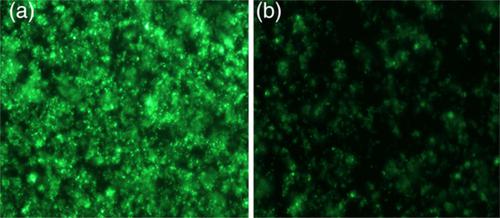当前位置:
X-MOL 学术
›
J. Food Saf.
›
论文详情
Our official English website, www.x-mol.net, welcomes your
feedback! (Note: you will need to create a separate account there.)
Anti‐adhesive effects of sialic acid and Lactobacillus plantarum on Staphylococcus aureus in vitro
Journal of Food Safety ( IF 1.9 ) Pub Date : 2020-11-22 , DOI: 10.1111/jfs.12875 Yingying Lu 1 , Yuzhuo Yang 2 , Lihua Liu 3 , Tianshu Yu 1 , Jingjing Zhao 1 , Libo Liu 1 , Chun Li 1
Journal of Food Safety ( IF 1.9 ) Pub Date : 2020-11-22 , DOI: 10.1111/jfs.12875 Yingying Lu 1 , Yuzhuo Yang 2 , Lihua Liu 3 , Tianshu Yu 1 , Jingjing Zhao 1 , Libo Liu 1 , Chun Li 1
Affiliation

|
Staphylococcus aureus (S. aureus) is a common food‐borne pathogen that causes severe diseases after adhesion to epithelial cells. Lactobacillus inhibits pathogenic bacterial adhesion and infection. In addition, sialic acid (SA) is widely known for its beneficial biological functions. A new way of reducing the occurrence of diseases and curbing the overuse of antibiotics is ingesting prebiotics and probiotics that regulate the intestinal flora. In this study, we first evaluated the anti‐adhesive effects of several strains of Lactobacillus on S. aureus. The study revealed that the S. aureus adhesion was inhibited by all the strains of Lactobacillus. Besides, the rate of inhibition by L. plantarum Z‐4 was significantly higher than other Lactobacillus species. We then investigated the effects of different SA concentrations (40, 100, 150, 200, and 260 μg/ml) on the growth and adhesion characteristics of L. plantarum and S. aureus. The results showed that SA influences bacterial adhesion by regulating the bacteria's growth characteristics. Finally, the effects of SA combined with Lactobacillus on the adhesion of S. aureus were assessed by competition, exclusion and displacement methods. SA with a concentration of 260 μg/mL combined with L. plantarum had the highest inhibition effect on the competition assays. In addition, the expression of S. aureus adhesion‐related genes was reduced. This provides a new perspective on the application of SA and/or L. plantarum and its potential to resist adhesion of S. aureus.
中文翻译:

唾液酸和植物乳杆菌对金黄色葡萄球菌的体外抗粘连作用
金黄色葡萄球菌(S. aureus)是一种常见的食源性病原体,在粘附到上皮细胞后会引起严重的疾病。乳酸杆菌抑制病原性细菌粘附和感染。此外,唾液酸(SA)以其有益的生物学功能而广为人知。减少疾病发生和遏制抗生素过度使用的一种新方法是摄取调节肠道菌群的益生元和益生菌。在这项研究中,我们首先评估了几种乳酸杆菌菌株对金黄色葡萄球菌的抗粘连作用。研究表明,金黄色葡萄球菌的粘附被所有乳酸菌菌株抑制。此外,抑制率植物乳杆菌Z‐4明显高于其他乳杆菌种。然后,我们调查了不同SA浓度(40、100、150、200和260μg/ ml)对植物乳杆菌和金黄色葡萄球菌的生长和粘附特性的影响。结果表明,SA通过调节细菌的生长特性来影响细菌的粘附。最后,通过竞争,排斥和置换方法评估了SA与乳杆菌结合对金黄色葡萄球菌粘附的影响。浓度为260μg/ mL的SA与植物乳杆菌联合对竞争试验的抑制作用最高。另外,表达金黄色葡萄球菌粘附相关基因减少。这为SA和/或植物乳杆菌的应用及其抗金黄色葡萄球菌粘附的潜力提供了新的视角。
更新日期:2020-11-22
中文翻译:

唾液酸和植物乳杆菌对金黄色葡萄球菌的体外抗粘连作用
金黄色葡萄球菌(S. aureus)是一种常见的食源性病原体,在粘附到上皮细胞后会引起严重的疾病。乳酸杆菌抑制病原性细菌粘附和感染。此外,唾液酸(SA)以其有益的生物学功能而广为人知。减少疾病发生和遏制抗生素过度使用的一种新方法是摄取调节肠道菌群的益生元和益生菌。在这项研究中,我们首先评估了几种乳酸杆菌菌株对金黄色葡萄球菌的抗粘连作用。研究表明,金黄色葡萄球菌的粘附被所有乳酸菌菌株抑制。此外,抑制率植物乳杆菌Z‐4明显高于其他乳杆菌种。然后,我们调查了不同SA浓度(40、100、150、200和260μg/ ml)对植物乳杆菌和金黄色葡萄球菌的生长和粘附特性的影响。结果表明,SA通过调节细菌的生长特性来影响细菌的粘附。最后,通过竞争,排斥和置换方法评估了SA与乳杆菌结合对金黄色葡萄球菌粘附的影响。浓度为260μg/ mL的SA与植物乳杆菌联合对竞争试验的抑制作用最高。另外,表达金黄色葡萄球菌粘附相关基因减少。这为SA和/或植物乳杆菌的应用及其抗金黄色葡萄球菌粘附的潜力提供了新的视角。











































 京公网安备 11010802027423号
京公网安备 11010802027423号